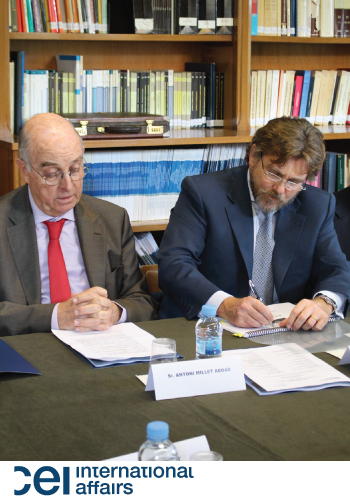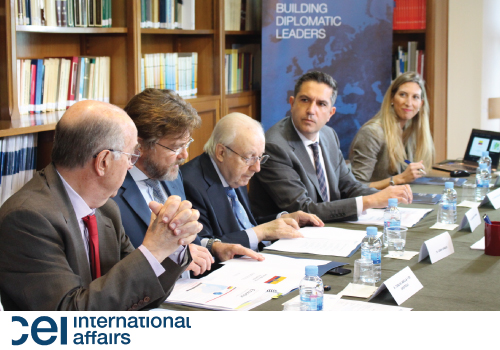The Hon. Mr. Carlos Abella y de Arístegui, Ambassador of Spain to the Republic of Ecuador, was invited to participate in the Meeting with Ambassadors of Spain, framed in the International Classroom organized by the CEI International Affairs. In this meeting, different personalities from the business world and international relations participated.
The Ambassador began his speech by enumerating a series of typical characteristics of Ecuador, which allowed attendees to obtain an overview of this country. Ecuador achieved independence in 1822, although it would not be independent as such until 1830. Throughout the nineteenth century there was a series of political, military and social changes that made that century and part of the next, a convulsive period for the country. Democracy is finally established in 1979.
 Regarding the cultural and ethnic diversity of the country (officially 6% of the population is indigenous, compared to 72% of mestizos), he pointed out that the demarcation between ascriptions is often diffuse, being the case that Ecuadorian citizens are often considered indigenous or mestizo because of factors that are not strictly ethnic, such as the profession or the geographical area of residence.
Regarding the cultural and ethnic diversity of the country (officially 6% of the population is indigenous, compared to 72% of mestizos), he pointed out that the demarcation between ascriptions is often diffuse, being the case that Ecuadorian citizens are often considered indigenous or mestizo because of factors that are not strictly ethnic, such as the profession or the geographical area of residence.
Ambassador Abella also reported on recent political developments: After the so-called party-crisis period (1996-2006), in mid-2006 Rafael Correa assumed the presidency of the country for two consecutive terms until mid-2017, when Lenin Moreno, the current president, also of the party runner, succeeds him in office. During the Correa phase, in 2008, the new constitution, called Montecristi, was approved, which aims to consecrate the postulates of socialism of the 21st century, among which to give a greater participatory role to its citizens.
The economy was also affected by the trade safeguard measures that were imposed from 2015 to May 2017 and further reduced domestic and foreign trade in the country. However, during 2017 and once the measures were dismantled, the economy and trade grew thanks to the entry of the Multiparty Agreement between the European Union and Ecuador, which has grown both imports and exports.
Currently, President L. Moreno has taken a series of decisions to develop an economic reform of the country such as reducing public spending, eliminating safeguards, reducing VAT, a tax reduction and public taxes, to try to reactivate the country’s economy. This has finally led Ecuador to reach an agreement with the IMF and other International Financial Institutions to establish conversations with the International Monetary Fund in an attempt to finance and manage its consolidated debt. In a positive way, we should mention, the low inflation of the country with a rate of 0.27% thanks to the dollarization of the economy, compared to a public debt of 45% of GDP, which means that the country risk remains high.

During the Q&A time several questions were raised: On the one hand, economic and energy issues arose, as well as on the type of health system existing in the country. On the other hand, the meeting gave rise to other exchanges on the access and level of university education in the country, the weight of Spanish Cooperation in Ecuador and the degree of involvement of diplomatic relations between different states, including Spain, first, by the Venezuelan crisis, and later, because of the case of J. Assange.
The Ambassador concluded by noting that, despite the difficulties, the country is beginning to show signs of economic recovery, making Ecuador an attractive country to make investments. He also referred to the challenges facing Ecuador in the coming years, among which the challenge of taking advantage of its hydroelectric potential or ending informal jobs (56% of the total), which reduce capacity State collection.
Report prepared by Nayara Maldonado Solís
Student of the Master in Diplomacy and International Public Service